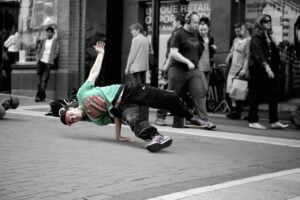In the N’gombe compound of an African city, Lusaka lived an old man. He possessed a unique personality. He was always beaming; whoever saw him called him ‘nkulu wakumwetulira’ (smiling old man). He had a thin frame. His face was all crinkly with white patches shining through the folds of his wrinkled skin. He had a prominent slouch. His grey, spiral, short hair gave him a sense of authority. The only oddity was his broken front teeth. Whenever he smiled, his anterior tooth gap stood out like an elephant’s trunk.
He lived in a nyumba (hut) in the corner, diagonally opposite the big charcoal pile. His hut had a small courtyard; there was a small fence made out of mismatched wooden pieces to cover his hut and demarcate it from the neighbour’s house. The thatched roof over his hut was broken in a few places. There was an umbrella tree under which he sat down every morning and displayed his cheery visage.
The big charcoal pile was an open shop run by a woman. Many people used to visit the Makala (charcoal) shop during the day. He greeted everyone who came to buy the charcoal bags. He mostly sought their attention by shouting greetings in Nyanja, the local language, and sometimes by screaming incoherent sentences in English.
People who came to buy charcoal bags were bemused by the old man sitting on an upturned matabwa dengu (wooden basket) under the tree and were taken in by his spirited greetings. They were given a flashy smile by the old man, who was oblivious to his tooth gap and atrociously stained residual teeth. It never made him ill at ease. The old man left them with no choice except to respond to his cheerful addresses.
He loved his wooden basket and had strategically placed it under the tree. He could see all the people going in and coming out of the compound, and the main street was also visible from where he sat. Every morning, after his frugal breakfast of watery mealie meal porridge, he sat on it and watched people from the compound leave for work; he made shrill whistling sounds upon seeing children going to school. A few vagabonds were not left out of his attention. He knew them by their names. He even forced one or two of them to come and sit with him every day for valuable life lessons. They sometimes left him rambling mid-way, and many times they indulged him and sat through his oft-repeated lessons till evening. In between, they were treated to his striking conversations with the charcoal buyers.
He was mostly cordial with the buyers and always welcomed them with gentle pleasantries, but then, of late, he began to shout at the buyers and consistently warned them of being charged highly for Makala owola (rotten charcoal).
His rants had started to irritate the mkazi wamkulu (big woman), owner of the charcoal shop, who had no option other than the large, empty space to set up her open shop, opposite the old man’s hut. Her shop was easily accessible and was just a few metres away from the Foxdale Court mall. Hence, she attracted the crowd who came to shop at the mall. She sold at least fifteen bags a day. Her business was flourishing.
She was a heavily built woman. Her hair was always in braids and neatly tied in a bun at the top of her head. She was a woman of a few words. She barely spoke at length with any of her customers. In fact, she was always wary of making her customers wait around too long in case the old man started off with his jibes and unwarranted compliments.
When she had set up her shop, the mkulu (old man) was quite friendly with her. As her business grew, he became overbearing. Her customers did not have a problem with him. They were actually quite entertained by his whistling and irreprehensible chatter. A few of her regular customers, especially Muzungus (white men), often went up to him and showered him with money or food. It was all fine with her till he took a U-turn and began bothering her customers. Ever since a few men spoiled him with money and food, he started hassling her customers for money and called names of some of the mmwenye (Indian) anthu (people). She apologised on his behalf and requested that they ignore him, but his harassment reached its zenith when he started pelting her buyers with stones and broken wooden sticks. This was too much for some of her customers, and they never returned to her.
“Makasitomala anu ndi zitsiru (your customers are idiots),” said the old man. Having said that, he giggled hysterically and fell off of his basket.
He knew his sight irritated the big woman. Nonetheless, this was the only way he could get the attention of the people visiting her shop. The money he received from some of her customers had become a sort of income for him. He behaved impeccably when these people came to buy it. He made good use of his smile and waved vigorously whenever they appeared. He tried this with all her other customers also, but not everyone had the time or money to spare. This angered him, and slowly this indifference frustrated him, and he became overly rambunctious. During one such episode, the big woman and the old man got into a nasty spat.
“Ndipo Ndiwe wabodza woopsa (and you are a horrible liar),” said Mkazi Wamkulu (the big woman).
Then she picked up the broom she kept for sweeping and charged towards the old man. She hit his legs; he was already on the ground laughing hard. His laughter made her absolutely crazy. She beat him, but he never stopped laughing. She picked up his basket, and just as she moved to put it over his head, his team of woyendayenda (vagabonds) showed up. They screamed at her. She came back to her senses and found the old man covered in black charcoal dust, flashing his broken, distorted, stained teeth at her. Had it not been for those boys, she would have certainly smashed his remaining teeth!
These boys – there were four of them – often came and sat with the old man and listened to the stories of his younger days; how he used to steal from shops, his clever tactics of begging on the streets and his drug abuse of cough syrups. He showed them how to use the cannabis plant. He narrated to them the stories of his encounters with beautiful young girls.
One day, when the old man was regaling these boys with tales of his conquests, a middle-aged woman showed up. The sun was boiling hot. They had all gathered under the lone, spindly tree in the mkulu’s (old man) tiny courtyard.
That woman carried slippers in her hand; her chitenge (African garment) embellished with the smiling picture of the country’s President, wrapped loosely around her hips, her white tank top barely covering her bosom, began to thrash the old man with those very slippers, shouting, “lekani kuvutitsa ana anga (stop hassling my daughters).”
She did not spare his coterie. They were all beaten black and blue. Thankfully for the boys, they ran away before the big woman from the charcoal shop joined in on spanking the old man with her broom. The boys witnessed the scene from far away, surprised at the courage of the old man. He was laughing uproariously!
Another day, the mkulu (old man) began his usual rants early in the morning. He bothered everyone who passed by his house with his perpetual complaints of how the world was cruel and unfair to him. He begged for money and food and made faces when nobody paid attention. It was often said by his neighbours and whoever knew him in the compound that he went to this asing’anga (traditional healers) and got himself all these herbs which were making him mad. Many had seen him rub some leaves in his hand and put them in his mouth. He was constantly chewing on something. They always found him outside his house, perched actively on his upturned basket, ready to assault whoever was unlucky enough to pass by his house. Some people were kind enough to leave leftovers and a few coins by his side. He always smiled at that generosity. A few minutes later, he was back to his old habits.
It had become known around the area that whoever went to buy charcoal from the big woman would be shouted and screamed at by the old man in a wooden basket.
The big woman’s business did suffer due to the old man’s antics, but after she complained to the police, the intensity of his assault was reduced. Her business was fortunately sustained. Her customers learned to ignore her. The old man also became too tactful in his tirades after a warning by the police. He knew he would be beaten up and locked up if he misbehaved a little too much.
He chose to criticise the charcoal instead of the customers buying it, “bwerani mudzagule Makala owola kwa mayi wonenepayu (come and buy rotten charcoal from this fat woman…”
The big woman knew there was no way to get rid of him. He was a permanent fixture on the upturned matabwa dengu (wooden basket). From morning till night, sitting on his mpando wachifumu wamatabwa (wooden throne), people always found him screaming, laughing, talking to himself, shouting at others, causing all sorts of ruckus.
Wakazi Wamakulu (the big woman) had learnt to ignore him. She knew better than to give in to the temptation of falling for his attention-seeking tricks, and also, she had exhausted her energy pounding him up a few times.
The scene had become tedious. All through the hot months and the winters, the old man exhibited an ample reservoir of energy and carried on non-stop with his schedule. The useless boys continued to visit him. Whatever the old man begged or received from a few kind people, he shared it with those boys. The days passed…
Then came the long, long season of mvula (rains). The big woman invested in a covered, inexpensive canopy to protect her charcoal bags; selling these bags sustained her household of four daughters and two sons. She had no man to take care of her. She knew, come rain or sunshine, she had to sell to make ends meet. Her business was good.
She used a part of the money she made selling charcoal to set up a small fritas (cheap, delicious snacks) stall on the Zambezi Road near Roma Parish Academy for her daughters. She woke up early in the morning to make fritas for sale. Her daughters then walked up to the parish to set up their stall, while the big woman, with the help of her young sons, carried the bags from her home in the compound not far from her open shop on a wheelbarrow. It usually took them two hours to carry all the bags for sale in the mornings. In the evenings, her load was usually lighter. She had a truck come in every Thursday for the delivery of charcoal bags. She got the bags on credit. She paid them every three weeks. A friend had set her up in this business. She was grateful for the income.
Although the rains slowed her business, she managed to survive. Her children were extremely helpful. She thanked God every day for keeping her children away from bad company. There were many young girls who got involved with the wrong men and had one or two babies. She had warned her daughters that if this ever happened to them, they would have to fend for themselves. Her ex-husband had left her for another mkazi (woman). And he gave her a hard time. So, she had set the same rules for her sons. She was a strict mother.
The only trouble she had in her life was with the old man in the wooden basket diagonally opposite her shop. He had been a nuisance ever since she set up her shop. It was a council space; her friend had gotten her permission to use it for her shop. The old man was very welcoming initially, but his true colours showed up when her business picked up. She was kind to the old man, thinking he was a lonely chap, and even used to bring food to him from home. Slowly, the rants and the abuse began, which got her goat… She tried to ignore him, but his cackles were too much for her to bear. He was outright abusive to her lady customers. He whistled and made lewd gestures, pointing at the women. They stopped coming. It was too much for the big woman, and that’s when she started to give it back to him.
This tug of war continued for a few months, then the news spread…
Anthu achichina (the Chinese people) had discovered a virus that had spread to many countries and was found in Zambia as well. The President had announced a few curbs to stop the spread of the disease. People had to wear masks. This was the hot topic in the compound. Everyone was discussing how the reduced bar timings and church days would impact their lives. The Zambian people had been through the difficult saga of HIV/ AIDS: they believed this would disappear in a few weeks and it would all be a thing of the past. Magalimoto apolisi (police vehicles) started patrolling the streets. People were being given free masks at the clinics. Radios were playing the safety measures over and over again. Television channels were airing horrible, fearful news. It became a wildfire. People locked themselves in their houses and only came out to buy food and other necessary items. The whole compound and the adjoining areas became quiet. It became rare to see children and elderly people outside their houses. Funerals that used to be humungous affairs have become family affairs. People like gardeners, maids, servants, and small business owners had to go out. They were scared too, but the daily wages put food on the table.
It changed many lives. Some lost jobs, while some lost their health on all levels.
***
Mkulu (the old man) was surprised to see people from the compound in chigoba (masks). He pulled their legs when they passed by his hut. He had no idea what was going on in the world. These people usually stopped and gave him dirty looks, though this time around they went past him in an inexplicable hurry. It baffled him. He had not come out of his house in a while because of the hard rain. Even the boys had not visited him. He looked at the charcoal shop while setting up his matawaba dengu (wooden basket). The big woman was quiet and had a mask on. She usually did her business standing, but that day she was sitting silent, seemingly lost. He thought of shouting at her and hurling abuse at her, but her sad, clothed face made him stop. Something has changed. He sat down and began his usual activities, but none of the passers-by indulged him by being angry. Fear was hanging loose. Even the big woman had no customers, and she had not stirred.
Perplexed, he decided to approach her. He went closer to her canopy and hardly said, “mkazi wamkulu iwe, wangokhala chete bwanji (you big woman, why are you quiet),” before the big woman began to wail loudly.
He stood there, amazed, while she cried without even looking at him. After listening to her wails for a good fifteen minutes, the old man went back to his basket and sat. The joy he received from looking at that big woman and from teasing her mercilessly had vanished from him. He went back inside early that evening.
The next morning, the big woman set up her shop. She knew what she had to do. She wanted to thank the old man as he had not made a mockery of her emotions. She felt a lot better after crying the day before. She had brought food to share with the old man. She waited for him to appear…
The old man came out and sat gently on his basket. He gently nodded towards the big woman. She approached him and offered him food. The old man asked her to sit. He asked her what her troubles were. She told him how the matenda achichina (Chinese disease) had affected her business and she was finding it difficult to even arrange food for her family. The old man put his hand over her head and said, “Madalitso anga ali ndi nu (my blessings are with you).”
Then he told her his name: Bwenzi (friend). He told her to go inside his hut and get his pillow. She went inside. There was a small, faded plastic mat that had a pillow and a large red blanket on it. The one-room hut was bare. She grabbed the pillow and came out. It was too dirty. She brought it to him. He told her to take it home with her and that after she had emptied the pillow, she should bring it back. He said there was something inside the pillow that would be useful to her. She took it as she did not want to hurt the old man. The old man thanked her for the food and told her to return to her shop as there was a customer waiting for her.
She appreciatively received a few customers that day. She kept the pillow over her purse and forgot about it …
That day was miraculous. She noticed she had made some money and the boys had returned to visit the old man. As soon as she saw them without their masks on, she told them to leave the place. The old man gave her a compassionate glance and told her it was fine; she should not worry. She heard their laughter and the old man’s snorts throughout the afternoon. By the time she was preparing to leave in the evening, the old man had gone inside. She grabbed her purse and collected the pillow and went back home.
***
The big woman and her sons were wearing five layers of garbage bags from head to toe. They had five layers of plastic gloves on their hands. Their eyes were visible as tiny holes. They were seen dragging a wheelbarrow with a body fully wrapped in white clothes along the road. They had a long way to walk towards the burial ground at Leopards Hill. They persisted. Rain was a foe that made their journey harder. At the cemetery, they lowered the body and prayed over it. The big woman named Kukoma Mtima (Kindness) placed the empty pillow cover over the body.
***
That same evening, as she went to bed, she thought of the old man. She remembered the pillow he had given her. She carefully displaced the wool and found money inside: It was not a small amount. She knew she would be safe for at least two years. She prayed for the old man that night and requested a pardon for her sins towards him. She knew she had to ask for forgiveness from him the next morning.
The next day, she went out early to set up her shop. She knew that today was the day to seek forgiveness. When she arrived, she saw his matabwa dengu (wooden basket) was lying there upturned. She waited and waited. The old man did not appear. The business was terribly slow, so she left her shop unattended and went to check in on the old man. She knocked at the flimsy door. The quiet made her uneasy. She pushed the door open and saw the old man lying face down. She knew it! She quickly came out and then remembered the boys; they must have passed on the disease to him. Her heart leapt out of her chest. She ran to her house and told her boys to inform the clinic. They returned, saying the clinic had no means to handle such cases. She did what her instincts told her to: she hoped for the best.
Many months later, life had become normal again. Her business was picking up. Everything remained the same except for the stillness that filled the old man’s empty hut. The wooden basket, battered by the rain, remained where it was, under the tree! Until one day, when the big woman saw it being moved. She thought the wind was displacing it, then she saw it moving forcefully as if someone was dragging it. It moved and moved till it came closer to her shop. She stood transfixed. And then she heard the cackles.
The old man had returned!










Sounds of Silence
Resemblance: A short story
Be my bride: Short Story